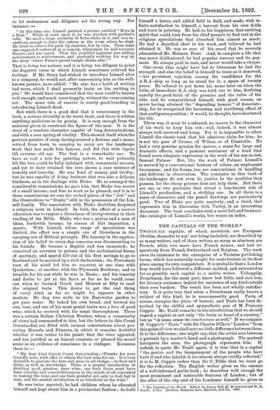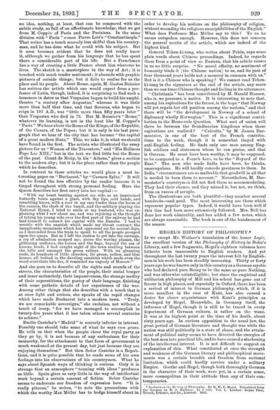THE CAPITALS OF THE WORLD.*
TWENTY-SIX capitals, of which seventeen are European (Dublin, shameful to say! not being included), are described by as many writers, and of these writers as many as nineteen are French, while two more have French names, and hail re- spectively from French Switzerland and Belgium. The work owes its existence to the enterprise of a Parisian publishing house, which has naturally sought for contributors in the first place among its own compatriots. It is probable that a London firm would have followed a different method, and entrusted as far as possible each capital to a native writer. Unhappily, Frenchmen, for the most part, know but little, and care less, for literary eminence, indeed for eminence of any kind outside their own borders. The result has been not wholly satisfac- tory. It is quite true that when a Frenchman really knows a subject of this kind, he is nnsurpassably good. Paris, of course, occupies the place of honour, and Paris has been de- scribed by the skilful and sympathetic pen of M. Francois Coppee. Mr. Trail remarks in his introduction that we should regard a capital as not only "the brain or heart of a country," but as "in some sense its countenance as well." If we compare M. Coppee's " Paris " with Sir Charles Dilke's " London "from this point of view we shall note no little differencebetween them. It is the difference, one might say, that the artist sees between a portrait by a master's hand and a photograph. The portrait interprets the man, the photograph represents him. If, indeed, to quote Mr. Traill again, it is true that in a capital "the genius and the temperament of the people who have built it and who inhabit it are almost always vividly reflected," it is to M. Copp& rather than Sir C. Dilke that we must go for the reflection. The English writer gives us the essence of a well-informed guide-book ; he describes well enough the most prominent and noticeable features of London ; but of the ethos of the city and of the Londoner himself be gives us • The Capitals of the World. Edited by Nancy Bell (N. D Anvers) and H. D. Traill. 2 To's. London: Sampson Low, Marston, and Co. 1892.
no idea, nothing, at least, that can be compared with the aubtle study, so full of an affectionate knowledge, that we get from M. Coppee of Paris and the Parisians. In the same division with " Paris " comes Pierre Loti's "Constantinople." That writer has a touch scarcely less skilful than his country- man, and he has done what he could with his subject. But it soon becomes evident that he does not really know it, although we gather from his language that he has spent there a considerable part of his life. But a Frenchman ita.s a way of creating a little France about him wherever he lives. The sketch is a masterpiece in the way of Art ; it is touched with much tender sentiment; it abounds with graphic pictures of outside things ; but it fails to realise for us the place and its people. About Rome, again, M. Gaston Boissier has written the article which one would expect from a pro- fessor of Latin, though, indeed, it is surprising to find such a looseness in dates as that Vespasian began to build his amphi- theatre "a century after Augustus," whereas it was little more than half that time, and that Severna, who began to reign in 193 A.D., was "little more than fifty years later" than Vespasian who died in 79. But M. Boissier's "Rome," whatever its learning, is not in the least like M. Coppe4's "Paris." We hear about the Rome of the Kings, of the Republic, of the Cmsars, of the Popes ; but it is only in his last para- graph that we hear of the city that has become "the capital -of a great modern State." This, we take it, is what we should have found in the first. The artists who illustrated the essay picture for us "Women of the Travestere," and "His Holiness Pope Leo XIII.," but in the text we find little but the Rome of the past. Count de Moiiy, in his Athens," gives a section to the modern city ; but it is the place rather than the people which he describes.
In contrast to these articles we would place a most in- teresting paper on "Bucharest," by "Carmen Sylva." It will not be found the less effective by the reader because it is tinged throughout with strong personal feeling. Here the Queen describes her first entry into her capital :—
" With my heart beating against my side, as an imprisoned butterfly beats against a glass, with dry lips, cold hands, and trembling knees, with a roar in my ears louder than the boom of the cannon, the clash of the bands, and the military playing the National Hymn, I tried to smile at my husband, who was ex- plaining what I saw about me, and was rejoicing at the thought of taking his young wife over the first part of the railway he had laid himself to connect his capital with the Danube. I had to wrestle with the anguish which made my throat contract, the inexplicable uneasiness which had oppressed me for several days, as I descended from the train to speak to all the people grouped upon the quays. But as I left the station to get into the carriage, a cry of admiration escaped me; above the waving plumes, the glittering uniforms, the horses and the flags, beyond the sea of human heads, I had caught sight of the town nestling between the hills and amongst the green valleys. With its gleaming roofs, its hundreds of little churches, its green, yellow, and blue houses, all bathed in the dazzling sunshine which made even the wood scintillate like fire, it reminded me vaguely of Moscow."
And she goes on to describe all the sights and sounds of the streets, the characteristics of the people, their social temper and inner melancholy, their impassiveness, the strange medley of their superstitions, the poetry of their language, finishing with some pathetic details of her experiences of the war. Among other things that she describes with a touch that is at once light and serious, she speaks of the rapid changes which have made Bucharest into a modern town. "Truly, we are remarkable sovereigns," she exclaims, not without a touch of irony, "for we have managed to accomplish in twenty-five years what it has taken others several centuries to achieve."
Emilio Castelar's " Madrid " is scarcely inferior in interest.
Possibly one should take some of what he says cunt grano. He tells us that when the people cheer the royal party as they go by, it is not because of any enthusiasm for their monarchy, for the attachment to that form of government is much weakened at the present day, but just because they are enjoying themselves." But then Sefior Castelar is a Repub- lican, and it is quite possible that he reads some of his own
feelings into his observations of his countrymen. What he says about Spanish ways of thinking is curious. Only it is strange that an atmosphere "teeming with ideas" produces so little. Spain gives us very little in the way of intellectual work beyond a certain amount of fiction. Seiior Castelar seems to underrate our freedom of expression here. "It is really piteous," he writes, "to note the precautions with which the worthy Max Muller has to hedge himself about in
order to develop his notions on the philosophy of religion, without wounding the religions susceptibilities of the English." What does Professor Max Muller say to this ? To us he seems outspoken enough. However, this does not concern the general merits of the article, which are indeed of the highest kind.
General Tchen-ki-tong, who writes about Pekin, says some plain words about Chinese proceedings. Indeed, he regards them from a point of view so Eastern, that his article rouses in us no little surprise. "No moral affinity, no sentiment of humanity binds it [the Chinese nation] to us, and its past of four thousand years holds not a memory in common with us." But is it a Chinese who is speaking ? We cannot read Tchen- ki-tong in the signature at the end of the article, any more than we can trace Chinese thought and feeling in its utterance.
"Christiania" has been contributed by M. Harald Hansen, who is, we presume, a native. It is interesting to note that, among his aspirations for the future, is the hope " that Norway will yet regain her old position among the nations," and that there will be "the development in Norway of a school of diplomacy wholly Norwegian." This is a significant contri- bution to the Home-rule Question. What sort of union will there be between the Scandinavian kingdoms when these aspirations are realised ? "Calcutta," by M. James Dar- mesteter, is one of the best of the French contribu- tions to the work, though it is somewhat tinged with anti-English feeling. He finds only one man among Eng- lish soldiers and statesmen whom he can praise, and that is Ontram. He must have been worthy, it may be supposed, to be compared to a French hero, to be the "Bayard of the East." The men who made India have been, he thinks, unscrupulous. He will hardly concede greatness to them. In India "circumstances are so malleable that goodwill is all that is needed to turn them to account." Nevertheless, M. Dar- mesteter's countrymen did not find them so accommodating. They had their chance, and they missed it, but not, we think, from an excess of scruple.
The illustrations are both plentiful—they number several hundreds—and good. The most interesting are those which represent popular types. Indeed, it would have been well if this line had been more extensively followed. Mrs. Bell has done her work admirably, and has added a few notes, which are always seasonable. The book is one of the handsomest of the season.



































 Previous page
Previous page